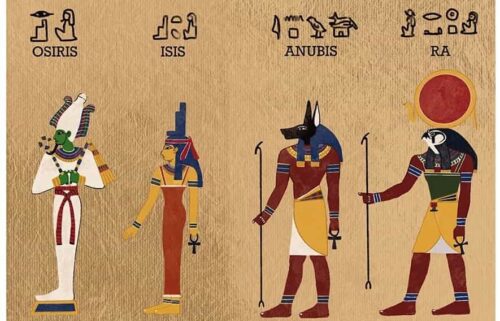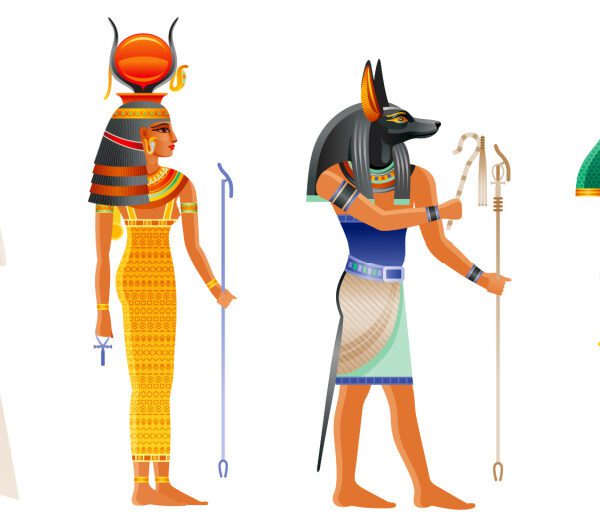

7 Powerful Ancient Egyptian Deities That Shaped History
Ancient Egyptian Deities: Exploring the Gods and Goddesses of Egypt ,The ancient Egyptian civilization is known for its magnificent pyramids, rich culture, and complex belief systems. At the core of their religious practices were the ancient Egyptian deities – gods and goddesses who played vital roles in the lives of both mortals and rulers. These deities shaped the way Egyptians viewed the world, life after death, and natural phenomena. In this post, we’ll take an easy-to-read journey through some of the most well-known deities, their characteristics, and how they impacted daily life in ancient Egypt.
The Importance of Deities in Ancient Egypt
In ancient Egyptian society, religion was deeply intertwined with every aspect of life. People believed that the gods controlled the forces of nature, such as the flooding of the Nile, the movement of the sun, and even life and death. This belief system influenced architecture, daily rituals, and even the political structure, as pharaohs were seen as divine or semi-divine beings connected to the gods.
Temples were built in honor of the gods, and elaborate ceremonies were held to please them and ensure balance, prosperity, and protection. With over 2,000 gods and goddesses in the Egyptian pantheon, these deities represented everything from creation and destruction to love, war, and the afterlife.
Key Ancient Egyptian Deities
1. Ra – The Sun God
Ra, the god of the sun, was one of the most important and widely worshipped gods in ancient Egypt. Egyptians believed that Ra was the creator of everything and the source of life. Every day, he sailed across the sky in his solar boat, bringing light to the world. At night, he traveled through the underworld, battling the chaos serpent Apophis to ensure that the sun would rise again the next day.
Ra’s connection to the sun made him a powerful symbol of life, growth, and renewal. Pharaohs often linked themselves to Ra, positioning themselves as his earthly representatives. Temples dedicated to Ra were built in many major cities, and offerings were regularly made to honor him.
2. Osiris – God of the Underworld and Resurrection
Osiris, the god of the underworld, played a central role in Egyptian beliefs about death and the afterlife. According to mythology, Osiris was a king who was killed by his jealous brother Set. His wife, Isis, collected his body and resurrected him, allowing him to become the ruler of the underworld.
Osiris was associated with resurrection and eternal life, making him a comforting figure for Egyptians who believed in life after death. They believed that, through proper burial practices and rituals, they could join Osiris in the afterlife. Osiris is often depicted as a mummified figure, symbolizing his role in the realm of the dead.
3. Isis – Goddess of Magic and Motherhood
Isis, the wife of Osiris, was one of the most beloved goddesses in ancient Egypt. She was seen as the epitome of a loving mother and a devoted wife. Isis was also a powerful goddess of magic and healing. It was through her magical abilities that she resurrected Osiris, and she protected their son, Horus, during his battle with Set for the throne of Egypt.
Isis’s widespread appeal went beyond Egypt’s borders, and she became one of the most worshipped deities in the ancient world. Her maternal and nurturing qualities made her a goddess that people could relate to, and she was invoked for protection, healing, and safe childbirth.
4. Horus – God of the Sky and Kingship
Horus, the son of Osiris and Isis, was the god of the sky and kingship. Often depicted as a falcon or a man with a falcon head, Horus was closely associated with the ruling pharaohs of Egypt. Egyptians believed that the pharaoh was the living embodiment of Horus on earth, and Horus’s battle with Set for the throne of Egypt was seen as a symbol of the struggle between order and chaos.
Horus’s eye, known as the Eye of Horus, became a powerful symbol of protection and healing. The Eye of Horus was often used in amulets and jewelry, believed to protect the wearer from harm.
5. Anubis – God of Mummification and the Afterlife
Anubis, the god of mummification and the afterlife, played a crucial role in guiding souls to the underworld. Depicted as a man with the head of a jackal, Anubis was associated with embalming and the protection of graves. He presided
over the weighing of the heart ceremony, in which a deceased person’s heart was weighed against the feather of Ma’at, the goddess of truth and justice, to determine their worthiness to enter the afterlife.
Anubis’s role in funeral rituals made him one of the most respected gods, and his image was often found in tombs to protect the dead.
6. Thoth – God of Wisdom and Writing
Thoth, the god of wisdom, writing, and knowledge, was revered as the divine scribe. He was believed to have invented writing and hieroglyphics, and he was responsible for recording the outcomes of the weighing of the heart ceremony. Thoth was also a god of the moon, often depicted as a man with the head of an ibis or a baboon.
Thoth’s influence was widespread, as he was called upon to settle disputes, maintain cosmic balance, and ensure that the gods and humans followed the laws of Ma’at.
7. Ma’at – Goddess of Truth and Justice
Ma’at represented truth, justice, and cosmic order. She was the personification of the natural balance that held the universe together. Pharaohs were expected to uphold the principles of Ma’at in their reigns, ensuring fairness, justice, and har

mony in the land.
During the weighing of the heart ceremony, it was Ma’at’s feather that determined whether a soul could pass into the afterlife. Her presence was felt in every aspect of Egyptian society, from the legal system to religious rituals.
List of Egyptian deities – Wikipedia
The Role of Deities in Everyday Life
The ancient Egyptian deities were not distant figures but were considered active participants in the daily lives of Egyptians. From ensuring good harvests and successful journeys to protecting homes and families, these gods and goddesses were invoked for all sorts of needs.
People would leave offerings at temples, such as food, flowers, and incense, to gain the favor of the gods. Priests played an essential role in maintaining communication between the gods and the people, performing daily rituals to keep the gods happy and ensure the prosperity of the land.
Conclusion
The ancient Egyptian deities were more than just religious figures; they were intertwined with every aspect of life in ancient Egypt. From the powerful Ra, who controlled the sun’s movements, to the nurturing Isis, who protected families, these gods and goddesses were a constant presence in the lives of the people.
Each deity brought something unique to the Egyptian worldview, shaping how they understood the world around them and the mysteries of the afterlife. Through their elaborate myths and powerful symbols, the legacy of the ancient Egyptian deities continues to captivate and inspire people to this day.
Recent Posts
Edfu Temple :5 Reasons to Explore the Majestic Today
Discover 7 Amazing Features of Sinbad Hotel Egypt for 2024
Top 7 Reasons to choose Egypt Air Hospital in Egypt
All Categories
Tags


Thailand






